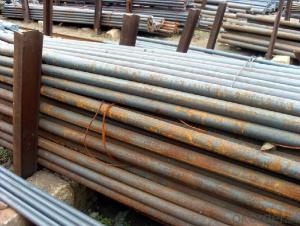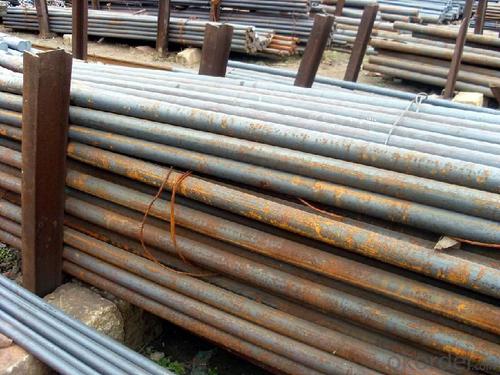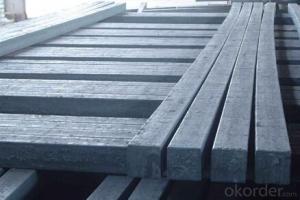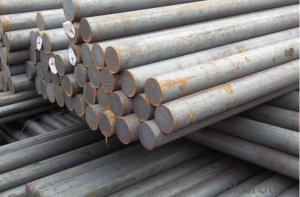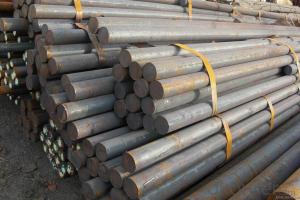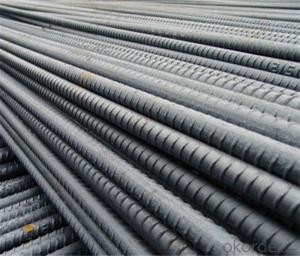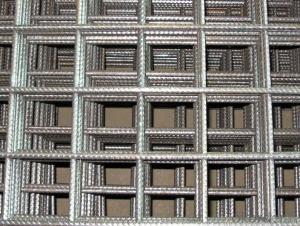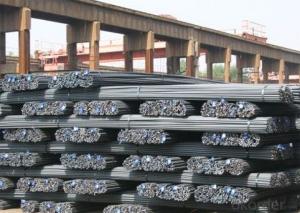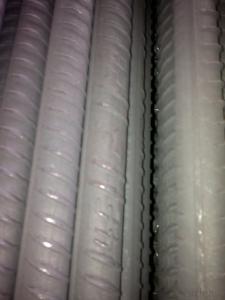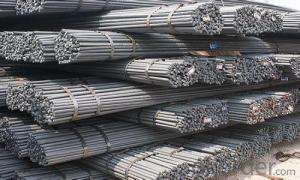Reinforced Building Steel Bars Deformed Steel
- Loading Port:
- China main port
- Payment Terms:
- TT OR LC
- Min Order Qty:
- 30 m.t.
- Supply Capability:
- 10000 m.t./month
OKorder Service Pledge
OKorder Financial Service
You Might Also Like
Specification
Reinforced Building Steel Bars Deformed Steel
Product Information:
1.Type:Metal Building Material
2.Material:Steel
3.Use:Building
4.Feature:Reinforced
Chemical Composition(%)
| C | Si | Mn | P | S | B | Cr | Cu | V | Mo | CEQ |
| 0.19 | 0.13 | 0.41 | 0.037 | 0.018 | 0.0015 | 0 | 0 | 0 | 0 | 0.26 |
Product Overviews:
| Product Name | Typical Grades | Diameter(mm) | Standard adopted |
| Carbon Steel | 20 (1020/S20C/C22) | Ø16-Ø300 | GB/SAE/JIS/DIN |
| 40 (1040/S40C/C40) | |||
| 45 (1045/S45C/C45) | |||
| Bearing Steel | GCr9 (51100/SUJ1) | Ø12-Ø250 | |
| GCr15 (52100/SUJ2/100Gr6) | |||
| GCr9SiMn (A485-Gr.1/SUJ3) | |||
| Cr-Mo Steel | 20Cr (5120/SCr420H/20Cr4) | Ø12-Ø250 | |
| 40Cr (5140/SCr440/41Cr4) | |||
| 42CrMo(4140/SCM440/42CrMo4) | |||
| Gear Steel | 20CrNiMo | Ø16-Ø600 | |
| 20CrMn(5115/SMnC420/20MnCr5) | |||
| 20CrNiMo(8620/SNCM220/20CrMiMo2) |
Product Show:

Our Advantages:
· Industry experience over 20 years.
· Shipment of goods -More than 70 countries worldwide.
· The most convenient transport and prompt delivery.
· Competitive price with best service.
· High technical production line with top quality products.
· High reputation based on best quality products.
With our experienced, enthusiastic and dynamic staffs, we assure to bring you the products with best quality, reasonable prices and good after-sales services under the motto: Friends First, Business After.
Communication, Experience, Expertise and Best efforts are our Promises to you.
- Q: What are the different processes involved in making special steel?
- The different processes involved in making special steel include melting the raw materials in a furnace, refining the molten steel to remove impurities, adding alloying elements to achieve desired properties, casting or forming the steel into desired shapes, heat treating to enhance its strength and hardness, and finally finishing processes like machining or polishing to achieve the desired surface finish.
- Q: What are the non-destructive testing methods used for special steel?
- Some of the non-destructive testing methods used for special steel include ultrasonic testing, magnetic particle testing, liquid penetrant testing, and radiographic testing. These methods allow for the detection of defects, cracks, or other imperfections in the steel without causing any damage to the material itself.
- Q: Can special steel be used in the pharmaceutical manufacturing equipment manufacturing industry?
- Yes, special steel can be used in the pharmaceutical manufacturing equipment manufacturing industry. Special steel offers several advantages such as resistance to corrosion, high strength, and durability, making it suitable for various applications in pharmaceutical manufacturing equipment. It ensures the hygienic and safe production of pharmaceutical products, meeting the industry's specific requirements and regulations. Additionally, special steel's ability to withstand extreme temperatures and harsh chemicals makes it a valuable material for manufacturing equipment used in pharmaceutical processes.
- Q: What are the advantages of using special steel in the renewable energy sector?
- Using special steel in the renewable energy sector offers several advantages. Firstly, special steel possesses exceptional strength and durability, making it ideal for withstanding extreme weather conditions and harsh environments often encountered in renewable energy projects. This ensures a longer lifespan and reduced maintenance requirements for renewable energy infrastructure such as wind turbines or solar panels. Additionally, special steel has excellent corrosion resistance properties, which is crucial in the renewable energy sector where exposure to moisture, saltwater, and other corrosive elements is common. This resistance helps prevent degradation and ensures the longevity of renewable energy components, reducing the need for frequent replacements and associated costs. Moreover, special steel can be tailored to specific designs and requirements, enabling the fabrication of complex and lightweight structures. This flexibility allows for the development of innovative and efficient renewable energy solutions, enhancing overall performance and energy production. Lastly, special steel is highly recyclable, contributing to the sustainability of the renewable energy sector. It can be easily recycled and reused, reducing the environmental impact and promoting a circular economy. Overall, the use of special steel in the renewable energy sector provides enhanced strength, corrosion resistance, design flexibility, and sustainability, making it an advantageous choice for renewable energy infrastructure.
- Q: Can special steel be used for making food processing equipment?
- Yes, special steel can be used for making food processing equipment. Special steel, also known as stainless steel, is commonly used in the food processing industry due to its unique properties. Stainless steel is non-reactive, meaning it does not interact with food or alter its taste, odor, or color. It is also resistant to corrosion, which is essential in preventing contamination and ensuring food safety. Additionally, special steel is durable, easy to clean, and has a smooth surface that prevents the growth of bacteria. These qualities make it an ideal material for making food processing equipment such as mixing tanks, conveyors, cutting tools, and storage containers.
- Q: What are the different certifications available for special steel?
- There are several certifications available for special steel, including ISO 9001, ISO 14001, ISO/TS 16949, and AS9100. These certifications ensure that the steel meets specific quality standards, environmental management practices, automotive industry requirements, and aerospace industry standards, respectively.
- Q: How does special steel contribute to the automotive aftermarket?
- Special steel plays a significant role in the automotive aftermarket by contributing to the development and enhancement of various automotive components. This high-quality steel is specifically engineered to possess exceptional strength, durability, and resistance to wear and tear. One of the primary ways special steel contributes to the automotive aftermarket is through the production of performance parts. These parts are designed to improve the performance and efficiency of vehicles, catering to the needs and preferences of car enthusiasts. For example, special steel is used in the manufacturing of exhaust systems, turbochargers, and intake manifolds, allowing for increased horsepower and torque, as well as improved fuel efficiency. Additionally, special steel is utilized in the production of suspension components, such as coil springs and sway bars, which provide superior handling and stability. These components not only enhance the driving experience but also ensure the safety of the vehicle and its occupants. Furthermore, special steel is instrumental in the manufacturing of braking systems, including rotors and brake calipers. These components are crucial for effective braking and maintaining control over the vehicle. By utilizing special steel, aftermarket brake systems can offer improved stopping power, reduced fade, and increased resistance to high temperatures. Moreover, special steel is employed in the production of engine components, such as crankshafts, connecting rods, and valve springs. These components are subjected to extreme forces and temperatures, and special steel's exceptional strength and heat resistance enable them to withstand such conditions, resulting in improved engine performance and longevity. In summary, special steel plays a vital role in the automotive aftermarket by contributing to the development of high-performance parts, suspension components, braking systems, and engine components. Its superior strength, durability, and resistance to wear and tear ensure improved vehicle performance, efficiency, and overall driving experience.
- Q: How long does special steel last compared to regular steel?
- Special steel generally lasts longer than regular steel due to its unique composition and properties. Regular steel is made mostly of iron and carbon, whereas special steel is alloyed with other elements such as chromium, nickel, and molybdenum to enhance its strength, hardness, and corrosion resistance. The lifespan of special steel depends on various factors such as the specific type of steel, its usage conditions, and maintenance. However, in general, special steel can have a significantly longer lifespan compared to regular steel. It is more resistant to wear and tear, corrosion, and high temperatures, making it suitable for demanding applications and environments. For instance, in industries such as aerospace, automotive, and construction, special steel is widely used for critical components like engine parts, structural elements, and cutting tools. These components often experience high stress, friction, and exposure to harsh conditions. Special steel's superior properties enable it to withstand these challenges and maintain its performance over a longer period of time. Moreover, special steel is often subjected to rigorous testing and quality control measures during its manufacturing process. This ensures that it meets specific industry standards and can endure extreme conditions without significant degradation. Regular steel, on the other hand, may not possess the same level of durability or longevity. In summary, while the exact lifespan of special steel compared to regular steel can vary depending on various factors, special steel generally lasts longer due to its enhanced properties and resistance to wear, corrosion, and high temperatures.
- Q: Can special steel be used in the wood manufacturing industry?
- Yes, special steel can be used in the wood manufacturing industry. Special steel, such as high-speed steel or tool steel, can be utilized in the production of cutting tools, saw blades, or other machinery components used in wood processing. These types of steel offer enhanced durability, hardness, and resistance to wear, making them suitable for various wood manufacturing applications.
- Q: How is HSLA steel used in the construction industry?
- HSLA steel, or High-Strength Low-Alloy steel, is widely used in the construction industry due to its superior strength and durability. It is commonly utilized in the construction of bridges, buildings, and other infrastructure projects. HSLA steel's high tensile strength allows for the creation of lighter and more efficient structures, reducing material costs and environmental impact. Additionally, its resistance to corrosion and atmospheric conditions makes it suitable for outdoor applications, ensuring the longevity of the constructed assets.
Send your message to us
Reinforced Building Steel Bars Deformed Steel
- Loading Port:
- China main port
- Payment Terms:
- TT OR LC
- Min Order Qty:
- 30 m.t.
- Supply Capability:
- 10000 m.t./month
OKorder Service Pledge
OKorder Financial Service
Similar products
Hot products
Hot Searches
Related keywords
